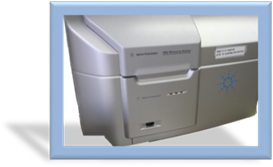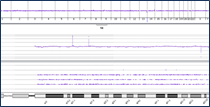
MICROARRAY CGH
(Comparative Genomic Hybridization, Chromosomal Microarray, CGH, Microarray, SNP & CGH Array)BACKGROUND:
Karyotype analysis has been the primary method for genome-wide identification of chromosomal amplifications and deletions for decades but quantitative genomic changes smaller than 3-5 million base pairs escape detection by this method. Comparative genomic hybridization (CGH) is a microarray based method that provides much more sensitive detection of such copy number variants ( CNV ) throughout the genome, identifying changes of 100kb and smaller. Advances in CGH technology have led to the discovery that small de novo CNVs are associated with developmental disorders and susceptibility to human disease (1). For example, there is now good evidence that 10% or more of autism cases are due to a number of duplication and deletion CNVs (2). Concurrently, numerous polymorphic CNVs have been identified (3) and the current challenge in using CNVs for diagnosis is that these benign CNVs have not been fully catalogued. For this reason, it is important that samples from both parents are analyzed as well as the patient to assist in the clinical evaluation of the results.
 Our Microarray CGH is a customization of the Agilent Technologies 180,000 oligonucleotide probe array including SNPs to detect regions of homozygosity. These arrays provide genome-wide coverage of quantitative variants while as well as providing comprehensive assessment of known deletion/duplication syndromes and detailed coverage of all subtelomeric regions.
Our Microarray CGH is a customization of the Agilent Technologies 180,000 oligonucleotide probe array including SNPs to detect regions of homozygosity. These arrays provide genome-wide coverage of quantitative variants while as well as providing comprehensive assessment of known deletion/duplication syndromes and detailed coverage of all subtelomeric regions.
References
- Ann Rev Genomics Hum Genet (2002) 3 : 199-242
- Nature Genet (2007) 39 : 319-328
- Am J Hum Genet (2007) 80 : 91-104
- Am J Med Genet (2007) 143 : 824-829
INDICATIONS FOR TESTING:
- mental retardation and/ or developmental delay
- Products of Conception (POC) or other fetal tissue.
- Copy number detection of anomalies in solid tumor and hematological cancers
- Prenatal diagnosis.
However, the CGH technology has shown positive results when no obvious syndromic features are found.
SAMPLE REQUIREMENTS: |
| Blood: 3-5 ml purple top (EDTA) vacutainer of whole blood inverted several times to mix. Forward within 48 hours at room temperature.
Please consult the lab for tissue or body fluid submission. |
| Amniotic Fluid: 0-15 ml amniotic fluid from 14th-17th week of gestation or one confluent T25 flask of cultured cells. Send specimen refrigerated, but not frozen (do not ship on dry ice). Please use an overnight courier service. |
| Test Method: SNP & Oligonucleotide chromosomal microarray |
| Turn around time: 10-15 days |
| Report: will include assay results.
Note that frequently, a definitive diagnosis may require reflex testing of parental samples in order to rule out benign copy number variants, found in both the patient and a parent. |

 Institute of Genomic Medicine
Institute of Genomic Medicine